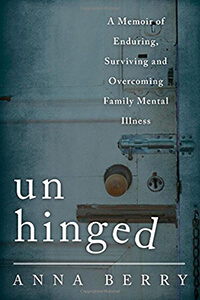October 15, 2014
By Simone McKitterick

Unhinged: A Memoir of Enduring,
Surviving and Overcoming
Family Mental Illness
By Anna Berry
Rowman and Littlefield (2014)
Purchase
When you have a family legacy riddled with psychosis, paranoia and suicide, the odds of avoiding these symptoms yourself don’t look so promising. Fortunately, through acceptance and a staunch commitment to her own recovery, author Anna Berry overcame those odds.
The book begins in the middle of one of Berry’s psychotic breaks. By this time, she has received many conflicting diagnoses from multiple mental health professionals and is living in a cheap motel, broke. We see her reminiscing on the events that led her there, including her family history. From the suicide of a great-great-great grandfather to her brother’s hallucinations, it’s clear that mental illness is very much hereditary in this family. Berry tells not only her own story, but also the story of how mental illness impacts an entire family. While Berry’s personal experiences provide context, it is the intergenerational narrative that makes her memoir come to life. When she describes her mother’s habit of driving the car around the block looking for corpses, or her brother’s severe avolition and susceptibility to scams, it is painfully clear how this environment led to Berry’s own psychological landscape. Unhinged’s timeline sways between her story and vignettes of the lives of her family members, highlighting the underlying theme of the book: Mental illness impacts everyone.
Berry receives little sympathy from the outside world. Her mother’s psychiatrist recklessly prescribes pills without ever addressing the underlying problems. Her brother refuses to look for work and instead manipulates their mother for money. The HR personnel at Berry’s job threatens to fire her due to repeated calls from her drug-addled mother, who is paranoid about her finances. Berry’s husband resents her family’s manipulative behavior and has a difficult time sympathizing with the stigmas mental illness.
Much of Berry’s personal struggles revolve around her romantic relationships. Despite having received multiple diagnoses, the one she identifies closest with is borderline personality disorder—a personality disorder characterized by severe mood swings, stormy relationships, impulsiveness and low self-esteem. The illness’s instability often comes with terrible anxiety, guilt and self-loathing, for which relief is sought at any cost. It is Berry’s interpersonal relationships that suffer most—from her habit of choosing emotionally unavailable men to her extreme mood swings that cause her to simultaneously cling to and push away the people who matter most in her life. The psychotic episode that opens the book is the breakdown Berry needs to reevaluate her needs.
Like substance abuse, many people with BPD need to hit “rock bottom” in order to change their lives, and Berry is no exception. She realizes that her psychiatrists and exes were right: She has a mental illness she is unwilling to acknowledge. Berry resumes her college attempts at meditation and mindfulness on her own, takes up yoga and starts seeing a therapist who believes in a combination of spiritually integrated talk therapy and cognitive behavioral therapy. Slowly, the fog of lifelong mental illness begins to lift. Today, Berry is a successful journalist and author.
Unhinged captures how Berry is able to break free from the cycle, and masterfully chronicles her family’s story. Berry’s own recovery is amazingly positive, but her ongoing fight to help her family members who still struggle is haunting.
Submit To The NAMI Blog
We’re always accepting submissions to the NAMI Blog! We feature the latest research, stories of recovery, ways to end stigma and strategies for living well with mental illness. Most importantly: We feature your voices.
LEARN MORE